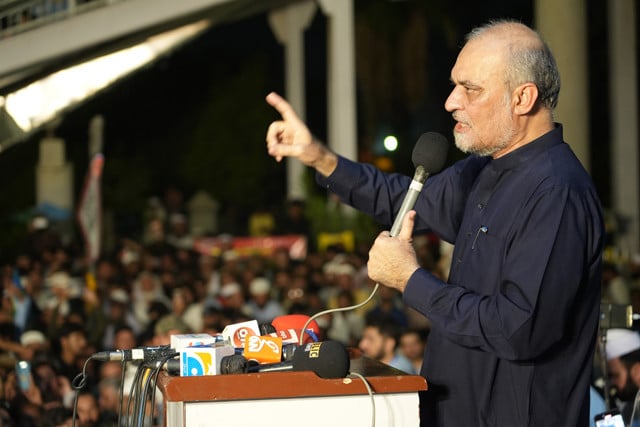RAWALPINDI: On Saturday, the Jamaat-e-Islami (JI) continued their protest against inflation at Rawalpindi’s Liaqat Bagh Chowk, causing traffic to jam up and causing residents and drivers to become immobile.

The sit-in, which was organized on Friday, began on the second day and for the last 36 hours blocked traffic on all highways in Rawalpindi city, Cantt, the inner city, and the districts around Liaquat Bagh. Additionally, the protest halted all business and economic activity.
Along with stopping the metro bus service, the roadblock caused disruptions to 300,000 people’s daily journey between Rawalpindi and Islamabad, which included employees and students. These residents were forced to pay thousands of rupees for trip by renting Bykea, motorcycles, and taxis.
Traffic was redirected onto nearby streets due to the closure of Murree Road between Chandni Chowk and Murir Chowk, which resulted in traffic jams and standstills. Business operations ceased as a result of the traffic system on the roadways coming to a complete halt. The rushed conditions that kept women inside their houses stopped them from going out to get goods.
Police blocked the roads leading to Liaquat Bagh Chowk at Murir Chowk, Chandni Chowk, and Committee Chowk with containers, causing ambulances to become caught in traffic multiple times. Blockades also occurred on other roads, including as Liaquat Road, China Market, Arya Mohalla Road, Iqbal Road, Raja Bazar, Fawara Chowk, College Road, Alam Khan Road, Rawal Road, Saidpur Road, Kashmir Road, and City Saddar Road.
Due to the metro bus stoppage caused by the sit-in, students were unable to attend colleges and universities, which had a significant impact on daily life. Due to the total stoppage on Friday and Saturday, there was no money generated by metro buses. Motorcyclists from Bykea exploited the circumstance by imposing exorbitant fees.
Shop owners were left idle while the purchasing and selling in the city’s plazas, markets, and commercial centers remained halted.
Trade leaders Ahmad Ali, Nauroz Khan, and Faisal Ali called for a defined protest location and a total prohibition on sit-ins on the city’s major thoroughfares and crossroads in order to prevent disruptions to everyday life and business operations. They emphasized that no major highway should be occupied by any political or religious party.











































